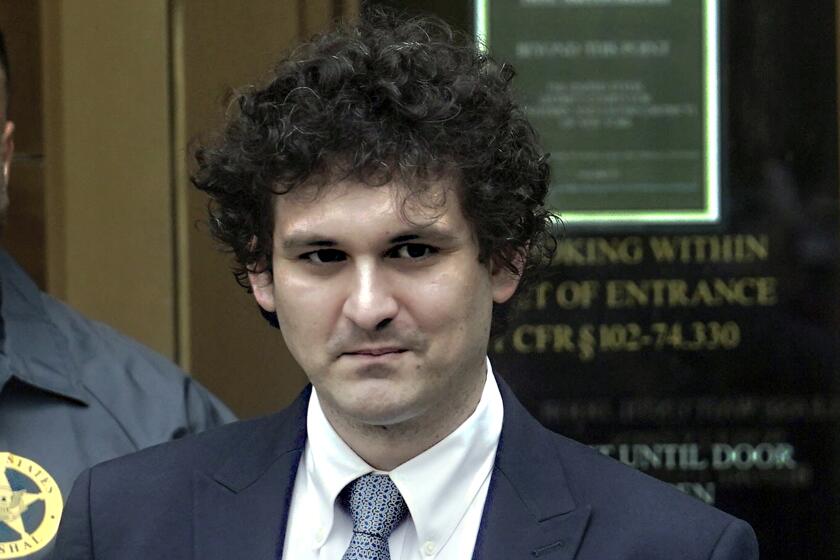Most Americans have a negative view of crypto. So why are political campaigns rushing to embrace it?

- Share via
The last year hasn’t been a very happy period in the cryptocurrency world.
News about the asset class has been almost invariably dire, full of reports of the fallout from bankruptcies among crypto firms, criminal convictions and sentencings of former crypto kings and other legal setbacks.
Yet there is one bright spot for the sector: In this election year, politicians are lining up to embrace crypto.
Many people who hold crypto...probably don’t identify as crypto advocates at all.
— Crypto critic Molly White
Some Democrats and Republicans have been long-term supporters of crypto. Among them is Rep. Ro Khanna (D-Fremont), who last month joined 13 of his Democratic colleagues in Congress to urge the Democratic National Committee to “take a forward-looking approach to digital assets and blockchain technology.”
Their letter to the DNC argued, implausibly, that these technologies will “have an outsized impact in ensuring victories up and down the ballot.”
Get the latest from Michael Hiltzik
Commentary on economics and more from a Pulitzer Prize winner.
You may occasionally receive promotional content from the Los Angeles Times.
Others are recent converts. Consider Eric Hovde of Wisconsin, who is running for the GOP nomination to challenge incumbent Democratic Sen. Tammy Baldwin this year. In 2021, when he was chairman and chief executive of Sunwest Bank, Hovde told an economic forum that the crypto market was “insanity. ... There’s nothing backing it. ... There’s nothing here.”
Hovde has since changed his tune. Last month he told Politico, “I support decentralized finance, and see Bitcoin as an asset for the future and fully support the community.” The industry lobbying organization Stand with Crypto designated him as “Very Pro-Crypto” on its website.
The industry’s big catch was Donald Trump. Back in 2021, he labeled crypto “a scam” in an interview on Fox News. “Bitcoin, it just seems like a scam,” he said. “I don’t like it because it’s another currency competing against the dollar.”
Cryptocurrency advocates are spending millions in political donations to obtain huge gaps in crypto regulations. They’re getting their money’s worth
But there he was last month in Nashville, delivering the keynote address at the Bitcoin 2024 industry conference. He promised to fire Securities and Exchange Commission Chair Gary Gensler, a decided critic of crypto, if he’s reelected president. (Trump would have no authority to fire Gensler before the latter’s SEC term runs out in June 2026.)
And Trump vowed to commute the 2015 life sentence of Ross Ulbricht, the creator of the crypto site Silk Road, who was convicted on charges of running what federal prosecutors called a “sprawling black-market bazaar” for drugs and other illegal goods. And he pledged to create a national “strategic reserve” of bitcoin, an idea that makes no coherent economic sense.
Even the campaign of Kamala Harris is treading carefully. Harris’ aides have approached leading crypto firms in quest of a “reset” of relations with the sector, according to the Financial Times. Those relations have been soured by Gensler’s anti-crypto initiatives and a general lack of enthusiasm for crypto in the Biden White House.
These developments are the offspring of a vast political campaign by crypto advocates. The campaign has two main elements. One is that feature common to all special interest campaigns: Money, dispensed by the pantload to current or wannabe members of Congress as well as aspirants to other positions, such as the presidency.
The other feature is deception. Crypto advocates have relentlessly flogged a claim that 52 million adult Americans are “crypto owners,” supposedly a single-issue voting bloc that politicians need to recognize.
The figure, which comes from a poll commissioned by the crypto firm Coinbase and would be equivalent to about 20% of the U.S. adult population, is manifestly absurd. As I’ve reported before, it’s flatly contradicted by a survey from the Federal Reserve System, which found that only 7% of adults had “bought or held” crypto in 2023. That would place ownership at about 18 million adults.
Hiltzik: Sam Bankman-Fried’s seven guilty verdicts expose crypto as a swindle through and through
Sam Bankman-Fried gambled with a cryptocurrency scam and lost. His guilty verdicts make the rest of us winners.
Moreover, the Fed found that ownership had declined sharply in recent years, down from 11% of adults in 2021. In 2023, only 1% of adults had used crypto to buy anything or make a payment (down from 2% in 2021).
That points to a fundamental truth about crypto: No one has yet identified a serious use for it in the real world — or at least in the world of legitimate finance. Crypto remains the tender of choice for criminals, including ransomware gangs.
What the crypto camp typically fails to acknowledge is that, for Americans outside of that shrinking cadre of holders, crypto emits a foul stench. According to a survey published in March, 61% to 77% of voters in six states the survey identifies as “swing states” (Arizona, Michigan, Montana, Ohio, Nevada and Pennsylvania) have a negative perception of crypto.
(This was a survey commissioned by Digital Currency Group, a big crypto investor, which fiddled the findings by saying they showed that “more than three-in-ten [voters in those states] report positive feelings toward crypto.”)
How strongly do even pro-crypto voters feel about it as a political issue? Not very, probably. Molly White, that indispensable and indefatigable chronicler of newfangled financial technology, conjectures that “many people who hold crypto ... probably don’t identify as crypto advocates at all.”
They’re more likely “worried about the climate, or their right to own firearms, or the safety and support of transgender people ... or their ability to obtain an abortion or retain access to contraceptives, or access to school vouchers, or any of the many other issues that factor in when people choose which candidates to support and oppose.”
The single-minded advocacy for crypto really comes only from a handful of financial types deeply invested in crypto for their own purposes.
There’s no doubt that they have lots of money to spend. The leading crypto campaign fund, Fairshake, has reported nearly $203 million in contributions as of June 30.
Fairshake spent more than $10 million starting last year in opposition to Rep. Katie Porter (D-Irvine) in her race for the Democratic nomination for U.S. Senate and Rep. Jamal Bowman (D-N.Y.) in his primary race for reelection. As it happens, both lost.
Porter was associated with Sen. Elizabeth Warren (D-Mass.) as a vociferous critic of crypto. Her victorious opponent in the primary, Rep. Adam B. Schiff, had taken a much more indulgent position, listing crypto among the “new developments in technology ... we need to grow” in order to keep jobs and regulatory oversight in U.S. hands. Bowman had voted against a series of anti-crypto bills in the House.
Investment promoters are pushing people to add cryptocurrencies to their retirement plans. Here’s why that’s a lousy idea.
Fairshake has smiled upon lawmakers who see things through crypto-colored glasses.
Among its top recipients in the current election cycle is Rep. Patrick McHenry (R-N.C.), who as chairman of the House Financial Services Committee pushed through a bill known as FIT21 that would take crypto regulation out of SEC hands and deliver it to the Commodity Futures Trading Commission, which is chronically underfunded and understaffed. (The measure hasn’t been taken up by the Senate.)
McHenry’s campaign has received $126,626 from the fund as of July 31, even though he has announced that he is not running for reelection this year and is retiring from Congress.
Fairshake is nothing like a grassroots fundraising operation. Of its $203 million, more than $160 million has come from six major crypto firms or investors, including Coinbase ($46.5 million), Ripple ($50 million), the venture firm Andreessen Horowitz ($44 million) and the firm led by Cameron and Tyler Winklevoss ($5 million), according to Open Secrets. Marc Andreessen, his partner Ben Horowitz and the Winklevoss twins have stated publicly that they plan further contributions in support of Trump.
Crypto spending on the election needs to be watched carefully. This isn’t an industry crucial for American economic development, notwithstanding its supporters’ assertions about its importance to financial innovation. So far, crypto hasn’t advanced the cause of innovation other than giving drug lords and criminal gangs a new way to ply their trades and swindle their marks.
Trump was right when he called bitcoin a scam, and Gensler was right when he called out the sector’s “record of failures, frauds and bankruptcies,” which occurred “because many players in the crypto industry don’t play by the rules.”
Like other businesses — legitimate and not so legitimate — that have mustered their millions in election campaigns, the crypto gang wants new rules to be written in its own interest.
The victims will be ordinary Americans who have been taken in crypto cons of one variety or another. Just because crypto users in the U.S. don’t really number 52 million, it doesn’t mean the rest of us shouldn’t be protected from a new breed of financial predator.
More to Read
Get the latest from Michael Hiltzik
Commentary on economics and more from a Pulitzer Prize winner.
You may occasionally receive promotional content from the Los Angeles Times.














